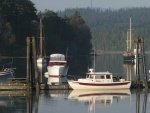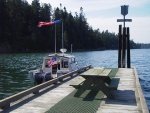robhwa,
Did you miss the part where it says that the salmon farms are spreading a disease from Norway which is killing off the native Pacific wild salmon?
That is the problem.
A parallel problem is that to raise farm fish, other food fish and bait fish have to be caught and turned into fish pellets to feed the farm fish.
REPLY: I appreciate your concern for salmon. Yes, I have read all of these posts. I worry that everyone wants to blame someone else for any problem. We often don't see ourselves and our actions as a problem. We typically focus on someone else, and it is usually a company that is blamed. It is often in the interest of others, in this case, individuals and companies that sell other salmon species, to rid us of that particular "problem".
Examples: Amazon is blamed for homelessness, Weyerhaeuser for habitat destruction, the United States for Iran's and Cuba's economic mess, immigrants for lack of jobs for Americans, the list goes on. I don't buy these either.
I am saying that disease transfers from one species to another are ONE problem. They certainly do not seem to be THE problem with wild salmon, and nobody that spends most of their time working on salmon science would likely say that...but they are handy to blame, and they are a problem. Providing animal protein to salmon from our local fish is also a problem, since it is not available to wild salmon.
Focusing on and eliminating Atlantic salmon farming as THE problem with wild salmon solves little. If the disease problem can be understood, addressed and eliminated it is no longer a problem. And then we still have the jobs.
Sorry that salmon are complex, but eliminating the Atlantic salmon farming industry is not going to solve the problem of dwindling wild salmon any more than eliminating hatchery stocking are, and blaming the Atlantic salmon farming industries IS handy. The list of problems with wild salmon is long, global warming, water flow, culverts, forestry and ag practices, point-source and non point-source pollution, endocrine mimics, parasites, surf perch, cutthroat trout...
It can be said, and some advocate, that we should eliminate any salmon fishing entirely, since we often hook wild salmon (I have many times), and even with careful hook and release, they sometimes die, particularly if you play them to exhaustion. So, is the next step eliminating hatchery stocking, and then on to eliminating sport fishing? Hatchery salmon can also introduce diseases. All are certainly problems with wild salmon. There is no THE problem.
By the way, I don't advocate eliminating stocking or fishing either. I love catching hatchery and wild salmon. I spend a lot of money pursuing them. I will advocate for them when I think my efforts will help. Farmed Atlantic salmon give me no joy at all, but right now they seem somewhat of a red herring for wild salmon problems.


